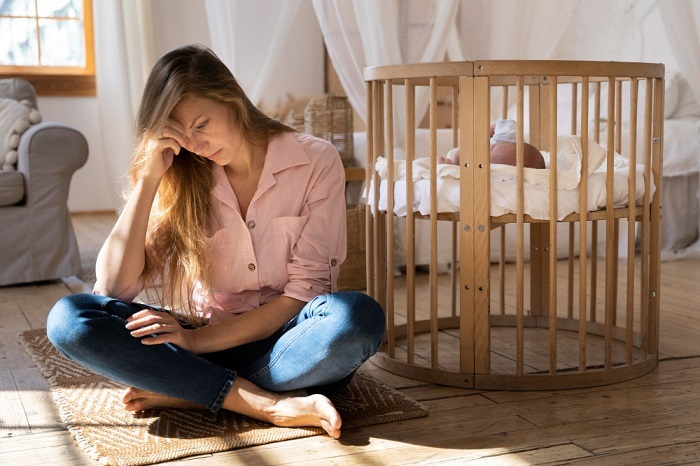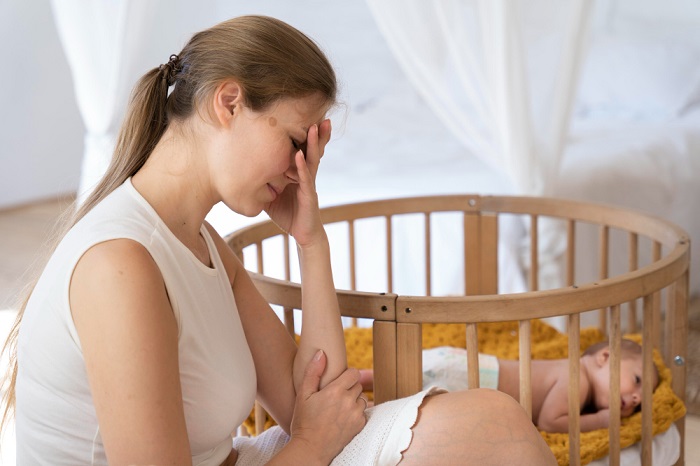The term postpartum depression is often used interchangeably with baby blues, but they are not the same thing. More specifically, most parents (around 60-80%) experience baby blues after the birth of a baby and this mostly has to do with hormones and an adjustment period. Typically, baby blues last no longer than two weeks. Postpartum depression, on the other hand, affects about 20% of parents well past those first two weeks. That’s 1 in 5 people, and the number one risk factor is already built into being pregnant and having a baby.
Feeling heightened emotions after a new baby comes into your life is a very common experience across all walks of life. Hormone fluctuations following birth, adjustment to the baby, and sleep deprivation work together to create a rollercoaster of emotions, frequent tearfulness, and overall exhaustion. Baby blues typically resolve on their own. However, if you have been experiencing any of these symptoms for over two weeks following the birth of your baby or your symptoms feel like too much to handle, what you may be experiencing is postpartum depression.
One in 5 new parents experience depression sometime during their first year postpartum. For a third of these people, depressive symptoms begin to appear during pregnancy. Further, there is a common misconception that postpartum depression only affects women. In reality, postpartum depression also affects partners and 1 in 10 fathers and supporting partners experience postpartum depression themselves. Symptoms may include feeling low on most days, having lasting fatigue, constantly feeling overwhelmed, not feeling connected to your baby, not feeling able to cope with it all, and just not feeling like yourself or how you imagined life with a baby would be, read on to see if what you’re going through may be closer related to postpartum depression than baby blues.
What is Postpartum Depression?
Postpartum depression is one of the most common complications of birth. Certainly, it’s widely known about, but it’s still not so openly discussed or accepted in many cultures. Parents who experience postpartum depression may feel too afraid, guilty, or alone to talk about it. Further, there are some misconceptions surrounding postpartum depression including that it only affects women or that it starts right after a baby is born. Postpartum depression can actually happen anytime during pregnancy or throughout the entire first year postpartum for both parents.
Further, when new moms and dads have baby blues, they typically still feel overall happiness in life and can take pleasure in things. Additionally, there’s no core change in self-esteem associated with baby blues. In other words, new parents experiencing baby blues don’t usually feel that deep shame, blame, or guilt associated with depression.
Moreover, all moms and dads are tired, that’s life! With baby blues, that tiredness does get better with rest. But if you’re experiencing symptoms of postpartum depression, it can often feel like a huge weight is on you – like you are always extraordinarily fatigued and no amount of rest makes it better.
Symptoms of Postpartum Depression
Mood and anxiety disorders during pregnancy and postpartum come from the intersection of your own biology, psychology, and social factors. Check out this diagram to see the different variables that create risk factors for postnatal depression and anxiety.
While postpartum depression symptoms may look different for everyone, some common ones to look out for include:

- Sadness
- Frequent crying
- Feeling ashamed, guilty, or hopeless
- Not feeling bonded or connected to your baby
- Anger and irritability toward others
- Not enjoying the things you used to like
- Feeling alone, isolated, and withdrawn from people you were once close to
- Being unable to fall or stay asleep at times when you could be sleeping
- Changes in appetite
- And even thoughts of hurting yourself, your baby, or someone else
Read more about things you can try at home today to help with postpartum depression and check out these bonding activities to try with your baby.
Ways to Ask for Support as a New Parent
If you’re going through a tough transition into parenthood but aren’t quite sure how to ask for the support you need, here are some conversation starters to try:
1. I’ve been having a hard time lately. Can we talk?
2. I really haven’t been feeling like myself. I need to share how things have been going for me.
3. Something doesn’t feel right and I need help figuring it out.
4. This has been a lot different than I imagined and I could use some extra support.
5. I’ve had a lot on my mind. Are you in a place to listen?
Dr. Ellen Kolomeyer from Unpolished Parenthood provides perinatal depression treatment in Plantation and virtual services to clients all over Florida. If you haven’t been feeling quite like yourself, get in contact at 305-619-3264 or message us now.

